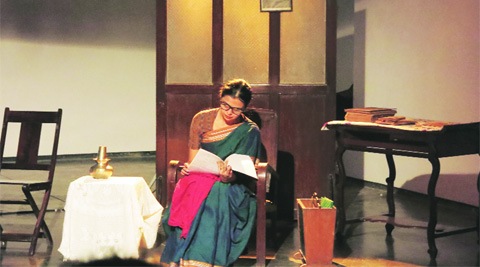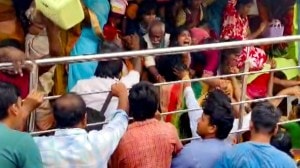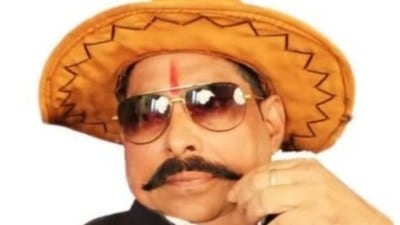Stay updated with the latest - Click here to follow us on Instagram
Feminist retelling
A dance theatre performance looks at Mahabharata from Gandhari’s perspective to touch upon gender issues
 Sanjukta Wagh in a scene from the performance
Sanjukta Wagh in a scene from the performance
Sounds of ghungroo bring to life the pitch-dark space at Colaba’s Project 88. Seconds later, a beam of light reveals Sanjukta Wagh’s presence, as she takes the stage with a tatkar — a piece that requires strong, quick footwork. But soon, the dance gives way to a powerful monologue where she speaks of how she feels betrayed by Krishna, who is shown as a musician seated in a far corner strumming a guitar.
In her latest performance, Wagh has taken on the character of Gandhari, mother of the Kauravas and wife to Dhritarashtra in Mahabharata. The performance, titled Rage and Beyond, is a contemporary interpretation of the epic from Gandhari’s perspective. It is based on Iravati Karve’s book, Yugant, written in the ’60s. “When I read the book, the character that called out to me was that of Gandhari. I wondered what could drive a woman to voluntarily blindfold herself and lead her life in darkness,” says Wagh, a Kathak exponent.
Gandhari’s marriage to Dhritarashtra also serves as the starting point of the performance that explores issues of feminism and gender. For instance, through Gandhari, it talks of the challenges of being a woman in a patriarchal society and the sacrifices expected of her for her family. “The title ‘Rage and Beyond’ represents the rage and anger women have to internalise at various stages in life,” adds Wagh who is also the founder of Beej, a multi-disciplinary dance initiative.
Conceptualised as part of a sociology seminar at the Mumbai University earlier this year, the performance evokes the voice of Karwe, one of the strong feminist voices of her time who wrote extensively in both Hindi and Marathi. She was also the first woman anthropologist in the country. In Yuganta, she studies the mythical heroes not only from a historical perspective but also from an anthropological and sociological standpoint. Karwe strips the characters of their godly qualities and looks at them with human motives, hopes and fears, thus making their stories more relevant to the readers.
The monologues depict various chapters from Gandhari’s life such as giving birth to a hundred sons and a daughter, her relationship with Krishna who she feels betrayed her by siding with the Pandavas, and her walking into a forest fire with her husband. The narrative is poetic and the dance aids Wagh in portraying the intensity of Gandhari’s emotions. One of the challenges faced by Wagh was the need to alter her performance to suit a gallery space. “I had to underplay the costume and the make-up. Since this is a more intimate space, I wanted to converse with the audience,” says Wagh, who plans to take the production to more venues in the city.
meenakshi.iyer@expressindia.com







